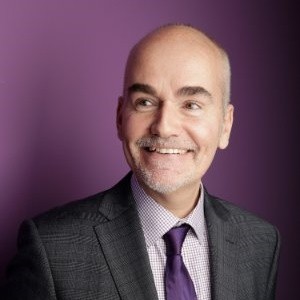Background
FSCS and its Chief People Officer David Blackburn are changing the perception of what it means to be a people-first organisation.
Perhaps one of the most well-supported workforces, the success of David and his team’s People Strategy is evident from the multiple award nominations and wins. David is Personnel Today’s HR Director of the Year 2020 and listed as one of the top 100 HR Directors in the World in the HRD Global 100 in 2021. Now, David speaks with us about his experience during the pandemic and how WeThrive has supported FSCS’s new focus on the individual employee experience.
During a period where many organisations have struggled to meet the needs of their people, FSCS has taken the challenges of the pandemic in its stride and radically reimagined their People Strategy over the last year. Strategically shifting from traditional employee engagement to individual ownership of the employee experience has given people at all levels of the organisation a new sense of empowerment.
However, David is quick to point out that this evolution didn’t happen overnight. Eight years ago when David joined FSCS just 43% of employees thought the culture of the FSCS was positive (Employee Survey 2013). Today, that number stands at 86% alongside an impressive eNPS score of 55.
So how did FSCS turn it all around?
Non-anonymous surveys are revelatory
FSCS discovered that employees needed to be as involved in their own employee experience as possible. The people who truly benefit from a healthy and happy workplace are the ones best suited to lead organisational change. This is one of the leading reasons why FSCS had adopted WeThrive’s non-anonymous survey as a blanket policy throughout the company.
David comments:
“Using a non-anonymous survey was revelatory. Anonymity results in a blended mish-mash of data and can only take you so far with understanding how people really feel. With individual insights you get absolute clarity about what is really happening and can pinpoint individual needs. This means the line manager can take ownership and really address each individual’s requirements.”
One of the most valuable aspects of using WeThrive’s non-anonymous surveys throughout the pandemic has been identifying and helping those impacted the most by Covid-related anxieties. This information was vital as it drove the initiatives that followed to reduce people’s stress and anxieties.
10% of people in FSCS were identified with further anxieties, and as a result were allocated weekly catch-up sessions with an in-house mental health first aider. These counselling sessions have ensured that their needs are being met and no-one falls under the radar.
More interestingly, however, these anxieties were not at all what David and his team expected to uncover. Their assumptions about the anxieties employees faced turned out to be the polar opposite.
For example, one of the biggest concerns they identified was around using public transport. The uncertainty of when they might return to work and what social distancing would look like on their way to and from the office was contributing to employee stress. FSCS quickly decided that giving staff a firm level of certainty would resolve this issue and immediately decided that conversations about returning to the office would A) not take place until September and B) ensure that employees understand they only have to do what makes them happy and comfortable.
This raises an interesting point and shows how critical listening to employees really is. Even for an organisation as switched on as FSCS who are very tuned into their employee voice can be surprised by their WeThrive survey data.
‘The strategy is driven by you’
Now, FSCS are supporting people to “own their days” and develop a personal career pathway. Flexibility is a cornerstone of its People Strategy, both in terms of job roles at the organisation and now regarding the practical elements of work, too. For example, FSCS has done away with core hours and introduced a new hybrid model of work.
Surveying has indicated that some employees are keen to get back to work and use the office space for socialising and collaborative team work. Others need the office to concentrate and get away from at-home distractions. And of course, there are plenty of employees who want to continue working from home.
With these results, FSCS have redesigned and repurposed their office to “work smarter”. Surveys indicated that employees would require changes to the office spaces and layouts to reflect the needs of an evolving workforce. For example, all meeting rooms now have a half-team capacity and are video conference enabled so in-person and in-office team meetings can run seamlessly. An updated concentration room has also been developed to give people an uninterrupted space to think along with a bigger breakout area for collaboration and social connection.
Engage. Listen. Act.
These three principles can be attributed to the long-term success of FSCS’s People Strategy. While many companies do one or two of these things, David ensures his organisation regularly follows all three stages to create a happier and healthier workforce.
Not long ago, FSCS wanted to know what employees wanted from the company culture, and whether they were excited about the future of work. Results showed that 50% of employees felt excited about the direction FSCS was heading in – but the other 50% didn’t actually know what direction the company was going.
This disparity indicated that it was time to engage with employees, listen to their feedback and act accordingly. David and the team asked “what do you want the culture to look like?” and “what gets you excited about work?”
Now, clear messaging and communication with employees is essential in maintaining and engaging strong relationships between FSCS and their people. This number has shot up and 86% of employees are excited about the direction of FSCS.
What’s next for FSCS?
David believes that the future of work feels different in 2021. A year on since Covid-19 emptied our offices, employees have been put firmly in the driving seat of their employee experience. Now, the outcomes of employee engagement surveys need to be focused towards professional development and career goals.
Learning and development opportunities at work must improve for people to get the most out of their employee journey. Nurturing new skills and creating an environment in which employees want to progress is essential for an engaged, happy and productive workforce.
Therefore, engagement and learning opportunities need to be high quality and easily accessible for employees. FSCS’s rewards programmes will be more geared towards celebrating skills acquisitions and personal and professional development.
A greater focus on the individual is going to be critical in the future of work. Coronavirus has made it clear that when given more freedom employees can thrive. With the support of WeThrive, FSCS will continue to empower their people to make the employee experience more personal, rewarding and healthier.
Soon, the WeThrive Bubble will be in action to make the individual employee experience priority. By giving ownership of their own development to your employees you’ll free up your HR and People teams to focus on what they do best: supporting managers and employees on their journeys.


